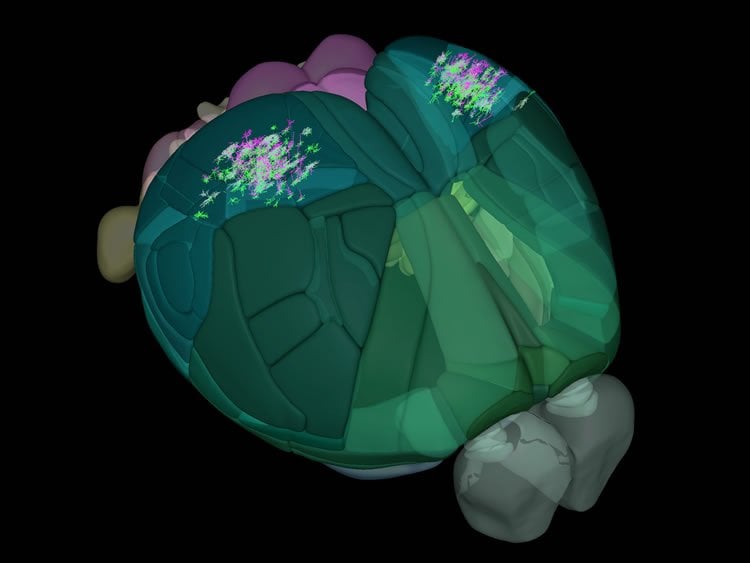Summary: Researchers have completed the 3D mapping of the mouse cortex.
Source: Allen Institute for Brain Science.
Data release also includes updates to several other Allen Brain Atlas resources.
The Allen Institute for Brain Science has completed the three-dimensional mapping of the mouse cortex as part of the Allen Mouse Common Coordinate Framework (CCF): a standardized spatial coordinate system for comparing many types of data on the brain from the suite of Allen Brain Atlas resources.
“Maps of the brain have always been created in two dimensions, but even a stack of flat maps sitting on top of each other does not necessarily align with the complex three-dimensional nature of the brain,” says Christof Koch, Ph.D., President and Chief Scientific Officer of the Allen Institute for Brain Science. “The Common Coordinate Framework is a remarkable effort to capture a typical mouse brain in its true three dimensions, and serves as a valuable platform on which to present many of our other data resources.”
“Annotating the cortex in three dimensions was no small task,” says Lydia Ng, Ph.D., Senior Director of Technology at the Allen Institute for Brain Science. “It required the expertise of both technologists and anatomists working closely and for many long hours to generate the data. The CCF enables quantification and comparison of many types of data, including gene expression, connectivity, single cell characterization and functional imaging. This is a truly unique resource for the neuroscience community to understand the structure and function of the mouse brain.”
The Common Coordinate Framework was built by carefully averaging the anatomy of 1,675 specimens from the Allen Mouse Brain Connectivity Atlas. Researchers used transgenic mouse lines and data from viral tracers to draw boundaries between 43 regions of the cortex.
The end result is a template brain rendered faithfully in three dimensions, which serves as a useful guide to mouse brain anatomy as well as a platform for comparing data across many Allen Brain Atlas resources.

The October data release also includes updates to several other resources. The Allen Brain Observatory, launched in May, received a back-end overhaul that enables robust search and the addition of more than 30 new datasets and additional engineered mouse lines. The Allen Cell Types Database and the Allen Mouse Brain Connectivity Atlas are also updated with new data.
Source: Allen Institute for Brain Science
Image Source: NeuroscienceNews.com image is credited to the Allen Institute for Brain Science.
[cbtabs][cbtab title=”MLA”]Allen Institute for Brain Science. “Allen Institute for Brain Science Announces Mapping of the Mouse Cortex in 3D.” NeuroscienceNews. NeuroscienceNews, 27 October 2016.
<https://neurosciencenews.com/3d-mouse-cortex-mapping-5367/>.[/cbtab][cbtab title=”APA”]Allen Institute for Brain Science. (2016, October 27). Allen Institute for Brain Science Announces Mapping of the Mouse Cortex in 3D. NeuroscienceNews. Retrieved October 27, 2016 from https://neurosciencenews.com/3d-mouse-cortex-mapping-5367/[/cbtab][cbtab title=”Chicago”]Allen Institute for Brain Science. “Allen Institute for Brain Science Announces Mapping of the Mouse Cortex in 3D.” https://neurosciencenews.com/3d-mouse-cortex-mapping-5367/ (accessed October 27, 2016).[/cbtab][/cbtabs]






